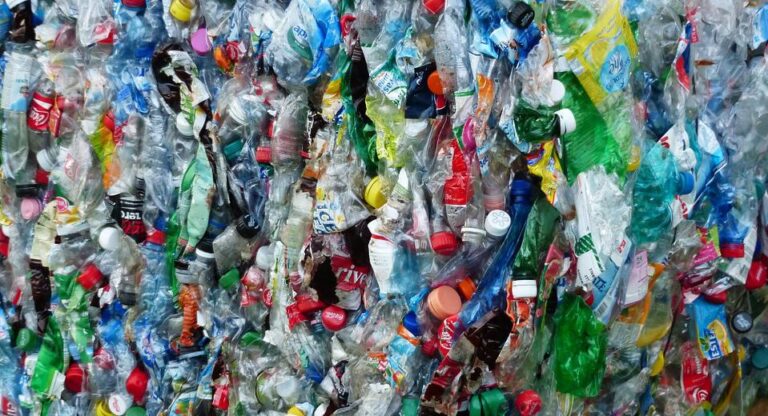In 2014, EU consumers created 25.8 million tonnes of plastic waste, with almost a third of that ending up in landfill, according todatafrom PlasticsEurope, an industry association representing more than 100 companies. In a green economy, this waste would be a valuable resource, but the current market doesn’t see it like that.The IssueThe green economy is an economic model that focuses on creating jobs and prosperity without harming the environment.The idea is to improve sustainability across all sectors by preventing waste, managing water resources, and better production and consumption.Creating a resource-efficient Europe is a key part of the EU’sEurope 2020growth strategy.‘Because the price of oil is down … the recycling business of plastics is dying,’ said Henry Saint Bris, senior vice-president of Suez Environment, speaking at the Transition to the Green Economy conference in Bratislava, Slovakia in September.Saint Bris explained that ‘80 % of the virgin plastic cost is oil’ while ‘80 % of (the) recycled plastic cost is labour and capital’.The price of Brent Crude oil has fallen from almost USD 140 per barrel in 2008 to under USD 50 per barrel in 2016. When the price of oil is low it is much cheaper to produce and sell virgin plastic, which in turn blocks recycled plastic from competing.‘I wouldn’t say oil prices are killing recycling … but they are giving it a very hard time,’ said Karmenu Vella, European Commissioner for Environment, Maritime Affairs and Fisheries, who was speaking at a panel discussing financing and investments for a green economy during the Bratislava conference.The solution could lie in finding ways to make old plastic more valuable, reducing the cost of sourcing materials and thereby making recycled plastic more competitive.‘If you look into the far future you could think about people getting paid for their plastic waste,’ said Dr Nick Wierckx, from RWTH Aachen University, Germany, and joint coordinator of P4SB, an EU-funded project looking to turn oil-based plastic waste into a biodegradable substitute.‘We want to find a new outlet for plastic waste which adds to its value, not like classical recycling when you go from a used bottle to a new bottle, but establish plastic waste as a carbon source for biotechnology, which would enable a huge range of new applications.’Munching through wasteP4SB is using genetically engineered bacteria to convert oil-based plastic waste into a new type of plastic which is fully biodegradable.“‘If you look into the far future you could think about people getting paid for their plastic waste.’Dr Nick Wierckx, RWTH Aachen University, GermanyThey are focusing on two of the most common types of plastic – polyethylene terephthalate (PET) and polyurethane (PU). ‘We use enzymes to break down PET and PU plastic into constituents called monomers,’ said Professor Lars M. Blank, who coordinates P4SB and is also at RWTH Aachen University.‘Then we use the monomers as a feed stock for the bacteria and they produce the bioplastic.’One of the project partners is hoping to develop a bioplastic as a substitute to PU which is currently used in furniture, footwear and electronics, while another is developing ‘bioglue’ for food labels, like the ones on apples which is often made from crude oil.‘This bioplastic also has some niche, high-value applications,’ added Prof. Blank. ‘Bioplastic can be used in surgical implants as it’s biodegradable so you wouldn’t have to open wounds (to remove the implants) anymore.’If recycling innovations like plastic-eating bacteria are successfully scaled up, then the value of plastic waste will increase along with the economic incentive to recycle. This could create a system less reliant on virgin plastic and help recyclers compete during low-oil prices.’Establishing a reliable production line for high-value up-cycled bioplastic would enable a more competitive recycling industry,’ said Dr Wierckx. ‘Then you can think about reducing the plastic ending up in the ocean.’
This article was originally published in Horizon, the EU Research and Innovation magazine.
Add to favorites:
Share:
Listing Description
Video
Documents
No documents available.
Ask KETMarket to make a contact
Connect with the Listing Owner!
💬 Please log in now to askKETMarket to make a contact. Not a member yet? Sign up for free and start connecting today!
Video
Related Funding and Finance Opportunities
Unlock Exclusive Funding Opportunities!
🔑 Get instant access to tailored funding opportunities that perfectly match your needs. This powerful feature is exclusively available to our premium members—helping you save time, stay ahead of the competition, and secure the right funding faster.
Upgrade to Premium now and never miss an important opportunity again! Already a premium member? Log in here to explore your matches.
Related Innovation Offers
Discover Tailored Innovation Offers!
🚀 Gain access to technology solutions that match your specific needs and interests—carefully selected to support your innovation goals. These offers are exclusively available to our premium members, helping you identify relevant technologies faster and start the right conversations with potential partners.
Upgrade to Premium now and explore your personalized technology matches today! Already a premium member? Log in here to view your tailored offers.
Related Knowledgeable Resources
Discover More with Premium: Related Knowledge Resources
🔒 You’re missing out on expert-curated knowledge specifically matched to this topic. As a Premium member, you gain exclusive access to in-depth articles, guides, and insights that help you make smarter decisions, faster.
Whether you’re preparing a funding proposal, researching a new market, or just need reliable information—our Premium knowledge matches save you hours of research and point you directly to what matters.
Upgrade to Premium now and instantly unlock relevant knowledge tailored to your needs! Already a member? Log in here to view your personalized content.

